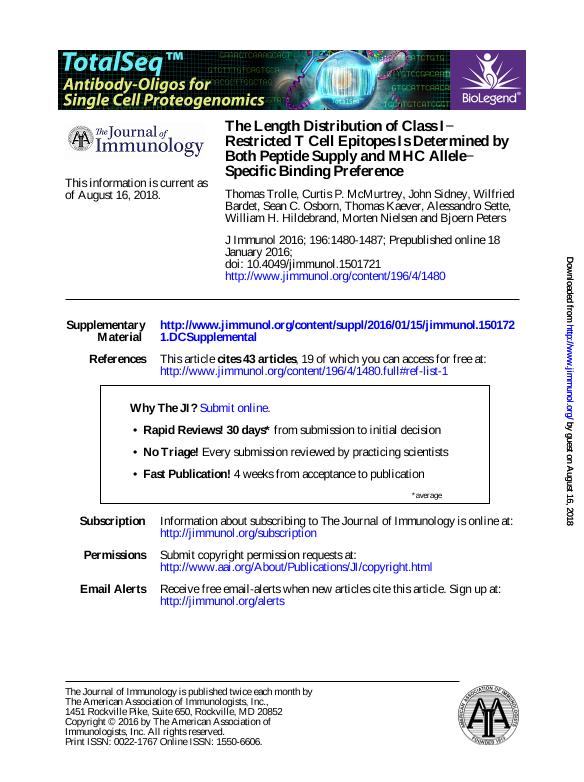Mostrar el registro sencillo del ítem
dc.contributor.author
Trolle, Thomas

dc.contributor.author
McMurtrey, Curtis

dc.contributor.author
Sidney, John

dc.contributor.author
Bardet, Wilfried
dc.contributor.author
Osborn, Sean C.
dc.contributor.author
Kaever, Thomas
dc.contributor.author
Sette, Alessandro

dc.contributor.author
Hildebrand, Willliam H.
dc.contributor.author
Nielsen, Morten

dc.contributor.author
Peters, Bjoern

dc.date.available
2018-08-16T18:51:11Z
dc.date.issued
2016-02
dc.identifier.citation
Trolle, Thomas; McMurtrey, Curtis; Sidney, John; Bardet, Wilfried; Osborn, Sean C.; et al.; The length distribution of class I-restricted T cell epitopes is determined by both peptide supply and MHC allele-specific binding preference; American Association of Immunologists; Journal of Immunology; 196; 4; 2-2016; 1480-1487
dc.identifier.issn
0022-1767
dc.identifier.uri
http://hdl.handle.net/11336/55981
dc.description.abstract
HLA class I-binding predictions are widely used to identify candidate peptide targets of human CD8+ T cell responses. Many such approaches focus exclusively on a limited range of peptide lengths, typically 9 aa and sometimes 9-10 aa, despite multiple examples of dominant epitopes of other lengths. In this study, we examined whether epitope predictions can be improved by incorporating the natural length distribution of HLA class I ligands. We found that, although different HLA alleles have diverse length-binding preferences, the length profiles of ligands that are naturally presented by these alleles are much more homogeneous. We hypothesized that this is due to a defined length profile of peptides available for HLA binding in the endoplasmic reticulum. Based on this, we created a model of HLA allele-specific ligand length profiles and demonstrate how this model, in combination with HLA-binding predictions, greatly improves comprehensive identification of CD8+ T cell epitopes.
dc.format
application/pdf
dc.language.iso
eng
dc.publisher
American Association of Immunologists

dc.rights
info:eu-repo/semantics/openAccess
dc.rights.uri
https://creativecommons.org/licenses/by-nc-sa/2.5/ar/
dc.subject
Mhc Class I
dc.subject
Binding Motifs
dc.subject.classification
Salud Ocupacional

dc.subject.classification
Ciencias de la Salud

dc.subject.classification
CIENCIAS MÉDICAS Y DE LA SALUD

dc.title
The length distribution of class I-restricted T cell epitopes is determined by both peptide supply and MHC allele-specific binding preference
dc.type
info:eu-repo/semantics/article
dc.type
info:ar-repo/semantics/artículo
dc.type
info:eu-repo/semantics/publishedVersion
dc.date.updated
2018-06-19T16:52:32Z
dc.journal.volume
196
dc.journal.number
4
dc.journal.pagination
1480-1487
dc.journal.pais
Estados Unidos

dc.journal.ciudad
Bethesda
dc.description.fil
Fil: Trolle, Thomas. Technical University of Denmark; Dinamarca
dc.description.fil
Fil: McMurtrey, Curtis. Oklahoma State University; Estados Unidos
dc.description.fil
Fil: Sidney, John. La Jolla Institute for Allergy and Immunology; Estados Unidos
dc.description.fil
Fil: Bardet, Wilfried. Oklahoma State University; Estados Unidos
dc.description.fil
Fil: Osborn, Sean C.. Oklahoma State University; Estados Unidos
dc.description.fil
Fil: Kaever, Thomas. La Jolla Institute for Allergy and Immunology; Estados Unidos
dc.description.fil
Fil: Sette, Alessandro. La Jolla Institute for Allergy and Immunology; Estados Unidos
dc.description.fil
Fil: Hildebrand, Willliam H.. Oklahoma State University; Estados Unidos
dc.description.fil
Fil: Nielsen, Morten. Consejo Nacional de Investigaciones Científicas y Técnicas. Centro Científico Tecnológico Conicet - La Plata. Instituto de Investigaciones Biotecnológicas. Instituto de Investigaciones Biotecnológicas ; Argentina. Universidad Nacional de San Martín; Argentina
dc.description.fil
Fil: Peters, Bjoern. La Jolla Institute for Allergy and Immunology; Estados Unidos
dc.journal.title
Journal of Immunology

dc.relation.alternativeid
info:eu-repo/semantics/altIdentifier/doi/http://dx.doi.org/10.4049/jimmunol.1501721
dc.relation.alternativeid
info:eu-repo/semantics/altIdentifier/url/http://www.jimmunol.org/content/196/4/1480
Archivos asociados
